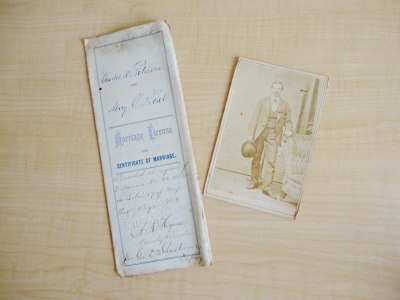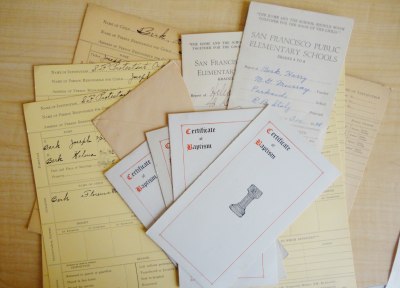It’s hard to believe it’s the end of the semester already. I feel like I’ve accomplished a lot with this special studies project and learned so much about working with paper-based archival collections and about oral histories. It’s been an amazing opportunity to create a mini archival collection. I realized about halfway through the semester I was incredibly ambitious when I made my original plan. I actually only added an oral history component because I didn’t think there’d be enough to do with the surveying and preservation aspect! Only about 70% of what I hoped to do actually got done, but I’ll keep chipping away at everything. The most important thing is that I found all of the old orphan records from the 1850s and on and that they’ll be preserved.
Over the past week, I met with Edgewood staff to go over the inventory of everything I found to see which records they wanted digitized. I had already planned to digitize a number of items for preservation reasons and for use in marketing projects. But I was surprised by some of the other items that people asked for electronically, like photographs from the 2000s. I politely declined to do anything too contemporary because of the sheer volume of items. But I somehow still ended up with a digitizing plan for approximately 200 records, most of which have multiple pages or need some sort of special handling! For now, I’ve prioritized the order of digitizing, but I am reserving the right to modify the plan as I progress.
The oral history interview that I had scheduled for December 3rd was unfortunately cancelled by the interviewee because of a severe rainstorm we had in the Bay Area that day. I was disappointed, but I completely understood and also didn’t want an elderly lady driving by herself across a flooded Golden Gate Bridge, so it was for the best. This interview and the interview with another former client of Edgewood have been scheduled for the first week of January.
I heard back from the archivist at the San Francisco History Center and she’s asked some questions about the records to help her decide which ones to take. I’ve also reached out to leadership at Edgewood to see which orphan files I can donate to the History Center, due to privacy issues. I suggested a 70-year gap, which I think is a standard and would allow files through 1944 to go to the History Center. At this time, Edgewood was still an orphanage, but some of the files do contain medical and adoption information, so there are definitely privacy issues to be considered.
I have completed a very thorough first draft of the transcription of the oral history interview I did a couple of weeks ago, with two full listens completed. Now, I just need to fact check a few names he mentioned and read it through one more time to check that it’s all coherent and flows well. Then I’ll share it with Edgewood staff and the interviewee. I’ll also check to see if the History Center would like a copy.
It’s astonishing to me, but I added up the hours I’ve spent on this project and it’s already over 168 hours – and I didn’t even finish everything on the project plan! Every step of my plan has taken so much longer than I expected. This is mostly due to finding so much more than I originally thought I would during my survey and having more people respond to my request to be interviewed for the oral histories. And of course, I’m a little slower than a professional archivist because this is my first time doing any of this in real life.
Now I’m just wrapping up my final report. The work will continue for several more months, until I can complete as much of my original plan as I can. What’s left is digitizing records, donating materials to the History Center, and completing two more oral history interviews. It’s a lot, but it’s doable over time.
I’ll continue to post updates here on my progress as I can!

